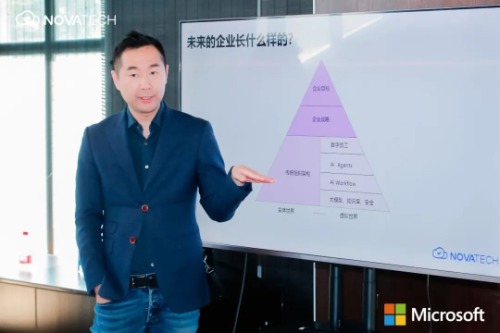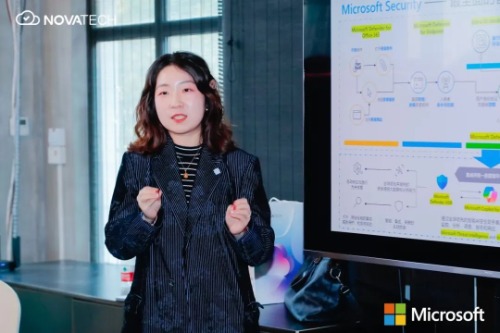Related Technologies
NovaFlow BPM Engine
Microsoft Dynamics 365 Business Central
Microsoft Dynamics 365 CRM
Microsoft Power Apps
Microsoft Power Automate
Microsoft Power BI
Related Technologies
NovaTech Service Center
NovaTech Support Team
ITIL Maintenance Tools
Related technologies
NovaTech Support Center
Nova Support Team
ITIL Operation Tools
Contact us
Support Hotline:400-902-9162
Company phone:021-22065380
Shanghai Office: Room 1506, Yuexiu Building, No. 388 Fushan Road, Pudong, Shanghai
Suzhou Office: Room 301, Yuanyuzhou Industrial Application Center, Yushan Town, Kunshan
Follow Novatech

Novatech × Microsoft × Dify: Intelligently Pioneering a New Chapter in AI
Events/Sharing Sessions
Novatech × Microsoft × Dify: Intelligently Pioneering a New Chapter in AI
The "Enterprise AI New Paradigm and Practice Summit & Novatech 2025 Year-End Customer Event," hosted by Shanghai Novatech and jointly supported by Microsoft and Dify, successfully concluded on December 18, 2025, amidst an atmosphere of intelligence and thoughtful exchange.
2025.12.18
What Enterprises Need to Pay Attention to as They Embrace AI
24
2025-03-24

On March 20th, as spring blossomed by the Huangpu River, Nova held in-depth exchanges and discussions with its clients.
2025 has fully ushered in the AI era. If 2023 and 2024 were not yet mature, 2025 calls for enterprises to deliberate on how to deploy AI and chart their future AI roadmap.
Human-Machine Collaboration Drives Enterprise Efficiency
「Human-machine collaboration」

The popularity of Manus has lifted the veil on AI Agents in advance—evolving from single-threaded operations to autonomous perception, planning, and task processing, envisioning a promising future.
1. Shift from Talent-Driven to AI Automation Strategy In 2024, we emphasized that the key to leveraging AI lies in talents capable of mastering it. As AI Agent technology matures, Agents will autonomously plan and execute most tasks, requiring humans only to issue simple commands.
2. Future Core Enterprise Architecture The AI era will bid farewell to traditional organizational structures, integrating the physical and virtual worlds: traditional team members on the left, and AI digital beings on the right. Under human-machine collaboration, humans primarily act as managers, focusing on core creative work while AI handles tedious tasks. Notably, AI digital beings rely on workflows and agents, making them key areas for current exploration and deployment.
3. AI Management Platform: Enhancing User Experience and Ensuring Enterprise Security Enterprises can unify AI applications across departments (marketing, sales, HR, finance, operations, IT) through a customized frontend platform, integrating SSO identity authentication, multi-tenant management, permission allocation, and log monitoring to optimize user experience and safeguard data security. On the backend, enterprises can leverage large model capabilities and low-code development platforms like Dify and Azure AI Foundry to rapidly build workflows and cultivate internal AI proficiency.
Data Security: An Inevitable Topic for Enterprises
Li Lu, Senior Solution Architect for Microsoft Modern Office and Security, shared insights on how Microsoft protects enterprise data amid AI development.
Currently, data breaches and AI risks are enterprises’ most pressing challenges:

80% of leaders worry about sensitive data leaks, and nearly half of enterprises still restrict generative AI (GenAI) usage.
GenAI threats include prompt injection attacks, over-reliance on model outputs, and unauthorized data sharing, necessitating prevention of data exfiltration and abuse in AI applications.
As the world’s largest security company, Microsoft provides comprehensive security solutions through Microsoft Security, integrating tools like Microsoft Defender for Office 365, Microsoft Defender for Endpoint, Entra ID Identity Protection, Microsoft Defender for Cloud Apps, Microsoft Defender for Identity, and Microsoft Sentinel. Driven by leading global AI security assistants, it enables unified management and operation of monitoring, analysis, investigation, reporting, and response for comprehensive security protection.
